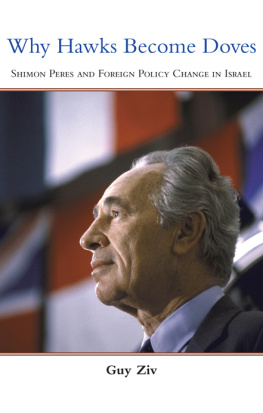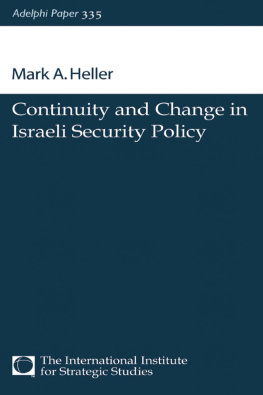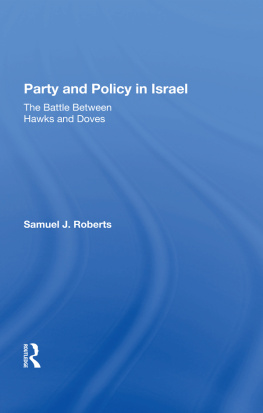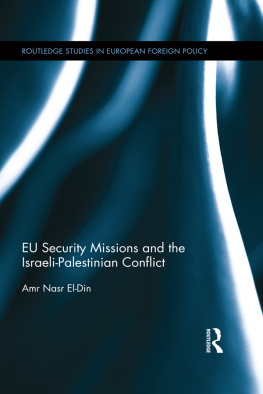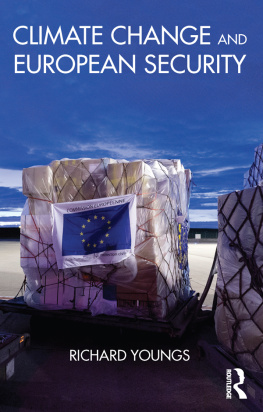Published by
S TATE U NIVERSITY OF N EW Y ORK P RESS , A LBANY
2014 State University of New York
All rights reserved
Printed in the United States of America
No part of this book may be used or reproduced in any manner whatsoever without written permission. No part of this book may be stored in a retrieval system or transmitted in any form or by any means including electronic, electrostatic, magnetic tape, mechanical, photocopying, recording, or otherwise without the prior permission in writing of the publisher.
For information, contact
State University of New York Press, Albany, NY
www.sunypress.edu
Production, Laurie D. Searl
Marketing, Kate R. Seburyamo
Library of Congress Cataloging-in-Publication Data
Ziv, Guy.
Why hawks become doves : Shimon Peres and foreign policy change in Israel / Guy Ziv.
pages cm
Includes bibliographical references and index.
ISBN 978-1-4384-5395-8 (hardcover : alk. paper)
ISBN 978-1-4384-5397-2 (ebook)
1. Peres, Shimon, 1923 2. Prime ministersIsrael. 3. IsraelForeign relations. 4. Arab-Israeli conflict. 5. Munazzamat al-Tahrir al-Filastiniyah. I. Title.
| DS126.6.P47Z59 2014 |
| 327.56940092dc 3 | 2014002124 |
10 9 8 7 6 5 4 3 2 1
To My Parents
ACKNOWLEDGMENTS

This book is based on my doctoral dissertation, which I defended in 2008 at the University of Marylands Department of Government and Politics. I was fortunate to have a first-rate committee that provided me with excellent guidance. Professor Shibley Telhami served as my mentor and dissertation chair. He challenged me to think rigorously about the logic underlying my arguments and offered me sage advice concerning the various theoretical challenges I encountered along the way. He was also instrumental in securing one of my interviews with then-vice premier Shimon Peres, the central case of this study. Professor Miranda Schreurs provided me with invaluable mentorship from day one, offering me useful suggestions concerning my research design and dispensing with practical advice for which I shall always be grateful. Each of my three other committee membersProfessors George H. Quester, John D. Steinbruner, and Vladimir Tismaneanuwas extremely helpful as well, offering constructive feedback on every chapter. Ann Marie Clark, the Department of Government and Politics Graduate Studies Program Coordinator, helped me navigate the treacherous waters of the universitys bureaucracy with infinite kindness and patience.
I was able to conduct my fieldwork in Israel due to the generous financial support from the American-Israeli Cooperative Enterprise (AICE), which rewarded me with two consecutive Israel Scholar Awards; the Morris Abrams Award in International Relations; and with a grant from the Melvin Gelman Religious School at Adas Israel.
During my fieldwork in Israel, several archivists were instrumental in helping me to identify the relevant material for my project. I would like to thank Doron Avi-Ad of the IDF Archives, Michal Saft of the Israel State Archives, and Dr. Michael Polishchuk of the Moshe Sharett Israel Labor Party Archive. I thank, also, my fifty-six interviewees for their time, candor, and unique insight.
I am indebted to Dr. Michael Rinella for his patience and thoroughness as the editor at SUNY Press. Other members of the SUNY Press team have also played important roles in the production of this book. I thank Laurie Searl, Senior Production Editor; Alan V. Hewat, copy editor; Kate Seburyamo, Production Manager; and Michelle Alamillo, Exhibits and Awards Manager, for their hard work and dedication to this project. I also am grateful to Rachel Nash of Twin Oaks Indexing, who, working under a tight deadline, prepared the index for this book. I appreciate her meticulous attention to detail.
Material contained in appeared in my articled titled Simple vs. Complex Learning Revisited: Israeli Prime Ministers and the Question of a Palestinian State, Foreign Policy Analysis, Volume 9, Issue 2 (April 2013): 20322. I thank Wiley for permission to reprint a revised version of this article.
Throughout this process, two of my closest friends spent a considerable amount of time poring over my work and offering detailed and thought-provoking feedback. I thank Dr. Mohammed M. Hafez and Dr. Jonathan Pearl for their constructive suggestions on draft chapters of the manuscript and for offering me consistently great advice.
Many colleagues, friends, and family members offered me helpful comments and support along the way. I am grateful to David Alpern, Dr. Boaz Atzili, Dr. Mitchell Bard, Helit Barel, Ben Bestor, Dr. Aaron Boesenecker, Dr. Michael Brenner, Laura Cutler, Mark Davidson, Andrew Eckstein, Jennifer Weiss Eckstein, Jonathan Gershater, Steven M. Glickman, Dr. Motti Golani, Dr. James M. Goldgeier, Dr. Louis W. Goodman, Yona Gorelick, Maryana Harouni, Dr. Dorle Hellmuth, Benjamin Hoefs, Laura Hoegler, Jo-Ann Hurvitz, Noah Hurvitz, Paul Johnson, Josh Kruskol, Dr. Arnaud Kurze, Carolyn Lindley, David Makovsky, Shoshana Marcus, Dr. David Mislan, Dr. Shoon Murray, Brett Nemeth, Jane Pearl, Richard Pearl, Dr. Yoni Peres, Jeff Pollock, Melanie Pollak, Jim Chaim Roberts, Jimmy Roberts, Chandra Rockoff, Kevin Rockoff, David Rockoff, Dr. Carolyn P. Rose, Dr. Brent E. Sasley, Anya Schmemann, Hena Schommer, Pete Sickle, Dr. Steven L. Spiegel, Dr. Jordan Tama, Dr. Krista Tuomi, Dr. Sharon Weiner, Amandine Weinrob, Jane Weiss, Michael B. Weiss, Dr. Zippora Williams, Dr. Ziv Williams, Carol Yasoian, Daniel Ziv, David Ziv, Gali Ziv, Jonathan Ziv, Mia Ziv, Nurit Ziv, Roni Ziv, Ariell Zimran, Dr. Bruno Zwass, Rosa Zwass, and Samuel Zwass.
Lastly, I thank my parents, Beverly and Dr. Moche Ziv, who were a source of constant encouragement throughout this project and to whom this book is dedicated.
ONE
INTRODUCTION
An Individual Level Explanation of Foreign Policy Change
Why do some hawkish leaders become dovish, thereby pursuing dramatic change in their states foreign policies, while other hawks remain committed to the status quo? Recent history provides us with important examples of prominent foreign policy hawks who underwent dovish transformations. These leaders shifts led, in turn, to major changes in their states foreign policies. Egyptian president Anwar Sadats peace overtures to Jerusalem, just four years after launching a surprise attack on Israel, led to the Egypt-Israel Peace Treaty in 1979. In South Africa, Nelson Mandelas repudiation of violence in his 1989 letter to President P. W. Botha set the stage for the countrys transition from apartheid to democracy. In the Soviet Union, Mikhail Gorbachev moved his country from a policy of containment to dtente between 1985 and 1991.
Yet major foreign policy transformations have occurred not only in authoritarian regimes, where change, some would argue, may more likely occur as a result of the whims of an authoritarian leader, but also in democratic societies. Gorbachev came to power and, in so doing, effectively reversed his hardline stance toward the country to which he had formerly referred as the evil empire (Farnham 2001; Fischer 1997).

